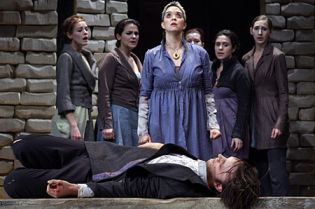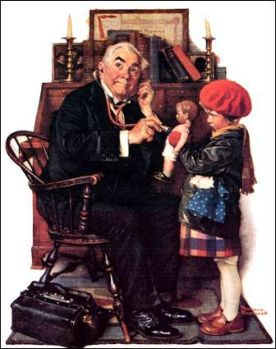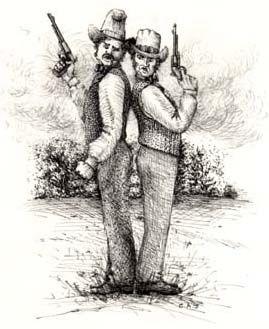The Laughs Keep Coming
From The American SpectatorOrestes
Sad as the sudden death by drowning of Dawn Brancheau at SeaWorld in Orlando undoubtedly was, it could also be seen as a terrible warning to the rest of us who increasingly see all entertainment as some version or another of a SeaWorld act, treating large aquatic mammals as nothing more than objects of our amusement. Admittedly, the pleasure that we derive from condescending to the characters in books, movies and TV shows is less likely to be brought up short by reality than was poor Miss Brancheau’s condescension to a five-ton killer whale named Tillikum, but the principle is the same. There is always something corrupting to the spirit in the voyeuristic enjoyment of really-existing life-dramas — whether the savage drama of the ocean depths or the banal passions of guests on a Jerry Springer Show — in which we are able to feel ourselves unimplicated and from which, therefore, we imagine we are somehow insulated.
This truth has occurred to me as I have continued to reflect on the subject of audience laughter, mentioned in this space a few months ago (see “An American Tragedy” in The American Spectator of November, 2010), at Racine’s classical tragedy Phaedre and at David Letterman’s confession on national television of inappropriate sexual behavior. I think what we are seeing there are the habits of attending which people have picked up from “reality TV,” and from soap operas that look like reality TV, and which have carried over into other forms of entertainment. As a result, we treat all of our amusements as being one or another kind of freak show from which our own lives are comfortably removed. That’s why we watch Racine or Shakespeare as if they were episodes of “Jersey Shore” or “Celebrity Rehab With Dr. Drew.” Like 18th century aristocrats laughing at the antics of Bedlam inmates or white folks at a minstrel show, we have grown so used to the objectification of those whom we pay to watch that we have lost the fear that Aristotle thought an appropriate reaction to tragedy — the fear that comes from self-identification with the tragic victim.
Now, of course, there are no more tragic victims but only (at best) Beckettian clowns — which is what Orestes (Jay Sullivan) and Electra (Holly Twyford) aspired to be in Anne Washburn’s translation/adaptation at the Folger Theatre in Washington of Euripides’s Orestes titled: Orestes: A Tragic Romp. Actually, the translation was for the most part straightforward, but for the addition of only a few anachronistic satirical shafts directed at Fox News — Orestes says he expects to get a “fair and balanced trial” — or the alleged “torture” practised by the Bush administration. But that only makes the whole exercise the more extraordinary. Up until the ending — of which I shall have more to say in a moment — there is very little in Euripides’s text to suggest anything “romp”-ish about the imminent execution by stoning of Orestes and Electra for the crime of killing their mother, Clytemnestra, in revenge for her murder of their father, Agamemnon. Yet the audience when I saw the show found plenty to laugh at.
It must be admitted, however, that this laughter was not entirely un-Euripidean in the sense that the laughter at Phaedre was un-Racinian. Euripides would have shared in the production’s dim view of Menelaus and Helen (both played by Chris Genebach) for their lack of sympathy with the plight of the matricidal siblings and especially in the laughter at its deliberately absurd ending in which Apollo — in the form of Lynn Redgrave’s voice on a loudspeaker — appears as a deus ex machina to let those crazy kids off their gruesome punishment. At their liberation, all the cast pull out little flags and sing with the chorus: “Hail, holy victory, hail” — though both Orestes and Electra look pretty shell-shocked as they do so. Alas, the impact of the joke was lessened by its having been flagged so far in advance — indeed, in the very title. Euripides himself might have told them that there is no point to the Theatre of the Absurd when everything is absurd and nothing ever rises above absurdity.
 |
His play, that is, must have intended both sympathetic self-identification with his principal characters when they are under sentence of death and the sardonic satire of their unexpected escape. Only the latter is now visible to us because we have lately grown accustomed to dissociating ourselves from those who suffer, as tragic heroes do, as a result of their own actions. I thought the same about a recent production of Shakespeare’s Measure for Measure in New York by the Theatre for a New Audience. As in Orestes, there is a mixing of tragic and comic genres in this play, and its ending is almost as absurd as Euripides’s. There, too, the audience anticipated the ending by laughing throughout at what might once have seemed a very unfunny situation in which the novice nun Isabella (Elisabeth Waterston) tries to save her brother, Claudio (LeRoy McClain), from execution for fornication by pleading with his judge, Angelo (Rocco Sisto), only to be told that she can save Claudio by engaging in an act of fornication of her own — with Angelo.
For a modern audience, unfortunately, the very idea of capital punishment for fornication introduces the absurd note way too early in the proceedings. Accordingly, Isabella’s terrifying dilemma was never taken seriously by the audience. There was laughter, for example, when the Duke (Jefferson Mays), who appointed Angelo and who is Shakespeare’s deus ex machina, dons disguise as a friar, instructing Claudio that he must school himself to welcome death as a release from life’s sorrows, and Claudio replies: “I humbly thank you.” There was laughter again when Isabella temporized about telling Claudio of Angelo’s proposition by saying that there was a way he might be spared but only
such a one as, you consenting to’t,
Would bark your honor from that trunk you bear,
And leave you naked —
whereupon Claudio impatiently says “Let me know the point.”
I could go on, but in these and subsequent laugh lines, as in the ending, I had to admit the laughter was not quite unwarranted. The grotesqueness of the moral situation, the caricatured extremes to which all the characters are driven at one time or another and, especially, the bizarre behavior of the Duke who could put a stop to the whole business at any moment but instead acts as puppet-master of the moral drama he causes to be played out — all these things suggest that laughter was part of what Shakespeare was going for, even at some of the places where great moral seriousness must also have been intended. As in the much better-known “comic relief” episodes of Hamlet, King Lear or Macbeth, laughter and seriousness are bound up together as two sides of the same reaction to the sad absurdity of the human condition. But for modern audiences, the serious side of things has dropped out of the equation and we are left with nothing but a vague sense that the play’s central conflict between love, honor and morality must also be some kind of satirical butt.
So I assume, anyway, from the New York Times review. “Keeping track of the saints and the sinners is pretty easy in Shakespeare’s Measure for Measure,” wrote Charles Isherwood, “because there is nary a saint in sight. Consider that Isabella, the apparent exemplar of moral perfection and the play’s chief cheerleader for purity, prefers to see her beloved brother beheaded rather than surrender her prized virginity. With angels like that, who needs demons?” Leave aside the vulgarity and sarcasm of “chief cheerleader for purity” and “her prized virginity,” can Mr Isherwood possibly imagine that his suggestion of a moral equivalence between Isabella and those who seek to coerce her into an unwanted sexual relationship, including “her beloved brother,” is remotely Shakespearean? Although ostensibly a comedy Measure for Measure reserves to itself the right to be serious on certain subjects, and these the audience appeared not to recognize.
But Mr Isherwood makes what I take to be a common assumption these days, namely that everything to do with morality is to be taken as satire — and not only satire but satire of the only form of immorality (if such it be) that our culture is now capable of recognizing, namely that of hypocrisy, self-righteousness and “judgmentalism.” I think we can safely say that Shakespeare was looking at a much, much bigger picture than this one when he wrote the play — a picture that grows progressively dimmer to those who have grown accustomed to TV “reality.” I don’t know how many of those in the audience were joining in the critic’s sardonic and ill-judged form of mirth and how many were laughing at the absurdities Shakespeare had actually put there, but I am inclined to believe that, as our hearts have been hardened by the ever nearer-approximation of dramatic characters to performing animals, those in the former camp probably outnumbered those in the latter.
Discover more from James Bowman
Subscribe to get the latest posts to your email.







